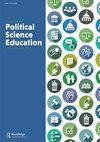通过自我评估和同伴评估评估同时进行的小组活动:应对主动学习中的“评估挑战”
IF 0.6
Q3 POLITICAL SCIENCE
引用次数: 1
摘要
教师试图在他们的课程中加入积极的学习元素,当他们试图给基于讨论的活动分配分数时,他们遇到了一个“评估挑战”,而这些活动并不能产生最终的成果。通过创建一种将评估纳入难以观察的活动的方法,这里提出的协议可以帮助教师将主动学习元素作为课程评估的关键部分,并且通过提供一个简单的框架,减少花费在标记上的时间。借鉴了学术教学中关于减少同行评价中的偏见和评分不规范的争论,并直接建立在劳伦斯·李的规范化协议上,该程序结合了自我和同行评价的分数,控制了不规范的评分做法和主观评分“韧性”的差异。随着政治和国际关系教学和学习的学术社区不断发展,对评估的持续关注可以帮助确保改进教学实践的这一重要因素,以更好地适应当今课堂(现实或虚拟)的现实。本文章由计算机程序翻译,如有差异,请以英文原文为准。
Evaluating Simultaneous Group Activities Through Self- and Peer-Assessment: Addressing the "Evaluation Challenge" in Active Learning
Abstract Instructors seeking to add active learning elements to their courses encounter an “evaluation challenge” when trying to assign grades to discussion-based activities that do not produce a final product. By creating a way to incorporate evaluation into hard-to-observe activities, the protocol presented here can help instructors make active learning elements a key part of the evaluation of courses and, by providing a simple framework, reduce time spent marking. Drawing on debates in the scholarship of teaching and learning focused on reducing bias and grading irregularities in peer-evaluation, and building directly on Lawrence Li’s normalization protocol, this procedure combines marks from both self- and peer-evaluations, controlling for irregular grading practices and differences in subjective marking “toughness.” As the community of the scholarship of teaching and learning in politics and international relations continues to grow, continued attention on evaluation can help ensure that this important element of pedagogical practice can be improved to better fit the realities of today’s classroom (real or virtual).
求助全文
通过发布文献求助,成功后即可免费获取论文全文。
去求助
来源期刊

Journal of Political Science Education
POLITICAL SCIENCE-
CiteScore
1.80
自引率
36.40%
发文量
69
期刊介绍:
The Journal of Political Science Education is an intellectually rigorous, path-breaking, agenda-setting journal that publishes the highest quality scholarship on teaching and pedagogical issues in political science. The journal aims to represent the full range of questions, issues and approaches regarding political science education, including teaching-related issues, methods and techniques, learning/teaching activities and devices, educational assessment in political science, graduate education, and curriculum development. In particular, the journal''s Editors welcome studies that reflect the scholarship of teaching and learning, or works that would be informative and/or of practical use to the readers of the Journal of Political Science Education , and address topics in an empirical way, making use of the techniques that political scientists use in their own substantive research.
 求助内容:
求助内容: 应助结果提醒方式:
应助结果提醒方式:


